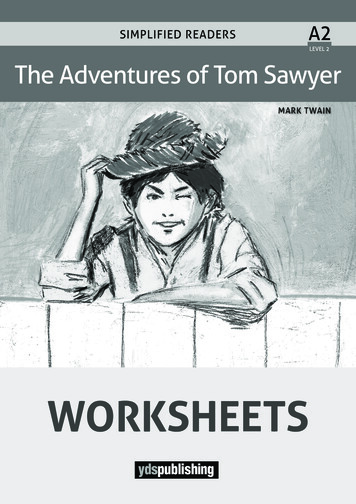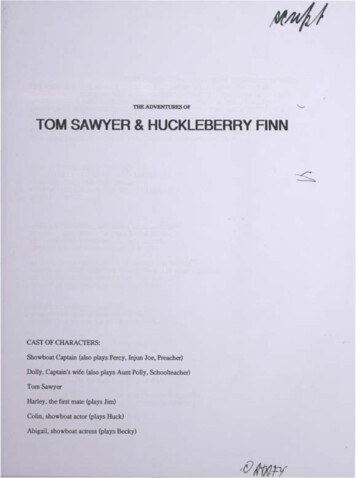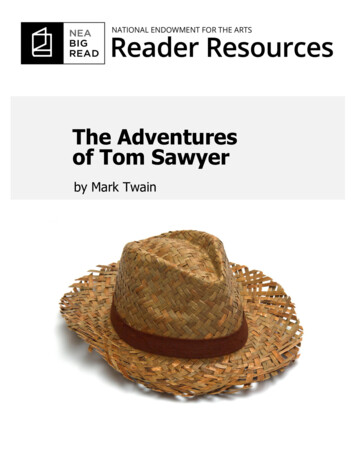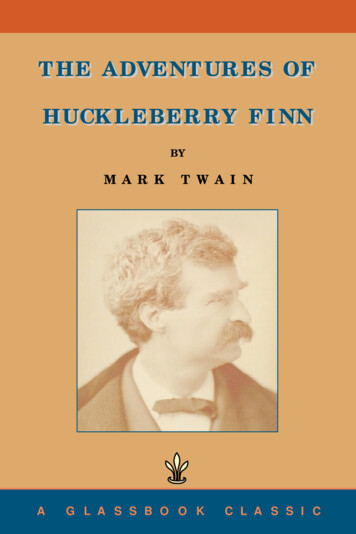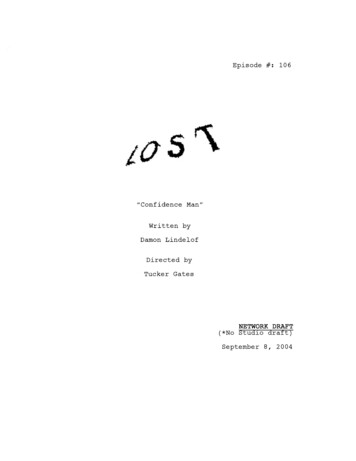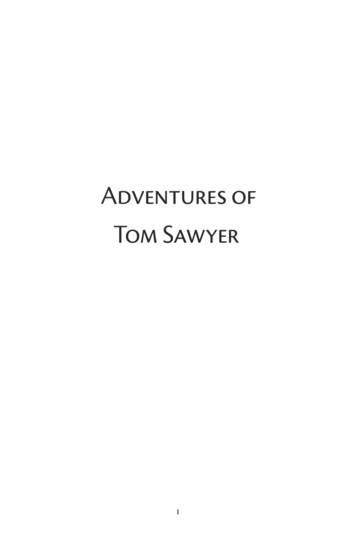
Transcription
Adventures ofTom Sawyeri
Adventures of Tom SawyerWritingsJim Smiley and His Jumping FrogThe Adventures of Tom SawyerThe Adventures of Huckleberry FinnExtracts From Adam’s DiaryEve’s DiaryThe Mysterious Strangerii
The Adventures ofTom Sawyer1876Mark Twain1835–1910信YOGeBooks: Hollister, MO2013:09:02:09:56:16iii
The Adventures of Tom SawyerCopyrightYOGeBooks by Roger L. Cole, Hollister, MO 65672 2010 YOGeBooks by Roger L. ColeAll rights reserved. Electronic edition published 2010isbn: 978-1-61183-168-9 (pdf)isbn: 978-1-61183-169-6 (epub)www.yogebooks.comiv
DedicationToMy WifeThis BookisAffectionately Dedicated.v
The Adventures of Tom Sawyervi
ContentsChapter IY-o-u-u Tom-Aunt Polly Decides Upon her Duty—Tom Practices Music—The Challenge—APrivate EntranceChapter IIStrong Temptations—Strategic Movements—The Innocents BeguiledChapter IIITom as a General—Triumph and Reward—Dismal Felicity—Commission and OmissionChapter IVMental Acrobatics—Attending Sunday—School—The Superintendent—“Showing off”—Tom LionizedChapter VA Useful Minister—In Church—The ClimaxChapter VISelf-Examination—Dentistry—The Midnight Charm—Witches and Devils—CautiousApproaches—Happy HoursChapter VIIA Treaty Entered Into—Early Lessons—A Mistake MadeChapter VIIITom Decides on his Course—Old Scenes Re-enactedChapter IXA Solemn Situation—Grave Subjects Introduced—Injun Joe Explainsvii
The Adventures of Tom SawyerChapter XThe Solemn Oath—Terror Brings Repentance—Mental PunishmentChapter XIMuff Potter Comes Himself—Tom’s Conscience at WorkChapter XIITom Shows his Generosity—Aunt Polly WeakensChapter XIIIThe Young Pirates—Going to the Rendezvous—The Camp—Fire TalkChapter XIVCamp-Life—A Sensation—Tom Steals Away from CampChapter XVTom Reconnoiters—Learns the Situation—Reports at CampChapter XVIA Day’s Amusements—Tom Reveals a Secret—The Pirates take a Lesson —A Night Surprise—An Indian WarChapter XVIIMemories of the Lost Heroes—The Point in Tom’s SecretChapter XVIIITom’s Feelings Investigated—Wonderful Dream—Becky Thatcher Overshadowed—TomBecomes Jealous—Black RevengeChapter XIXTom Tells the TruthChapter XXBecky in a Dilemma—Tom’s Nobility Asserts ItselfChapter XXIYouthful Eloquence—Compositions by the Young Ladies—A Lengthy Vision—The Boy’sVengeance SatisfiedChapter XXIITom’s Confidence Betrayed—Expects Signal PunishmentChapter XXIIIOld Muff’s Friends—Muff Potter in Court—Muff Potter SavedChapter XXIVTom as the Village Hero—Days of Splendor and Nights of Horror—Pursuit of Injun JoeChapter XXVAbout Kings and Diamonds—Search for the Treasure —Dead People and Ghostsviii
ContentsChapter XXVIThe Haunted House—Sleepy Ghosts —A Box of Gold—Bitter LuckChapter XXVIIDoubts to be Settled—The Young DetectivesChapter XXVIIIAn Attempt at No. Two—Huck Mounts GuardChapter XXIXThe Pic-nic—Huck on Injun Joe’s Track—The “Revenge” Job—Aid for the WidowChapter XXXThe Welchman Reports—Huck Under Fire—The Story Circulated—A New Sensation—HopeGiving Way to DespairChapter XXXIAn Exploring Expedition—Trouble Commences—Lost in the Cave—Total Darkness—Foundbut not SavedChapter XXXIITom tells the Story of their Escape—Tom’s Enemy in Safe QuartersChapter XXXIIIThe Fate of Injun Joe—Huck and Tom Compare Notes—An Expedition to the Cave—Protection Against Ghosts—”An Awful Snug Place”—A Reception at the Widow Douglas’sChapter XXXIVSpringing a Secret—Mr. Jones’ Surprise a FailureChapter XXXVA New Order of Things—Poor Huck—New Adventures PlannedConclusionix
The Adventures of Tom Sawyerx
PrefaceMost of the adventures recorded in this book really occurred;one or two were experiences of my own, the rest those of boyswho were schoolmates of mine. Huck Finn is drawn fromlife; Tom Sawyer also, but not from an individual—he is acombination of the characteristics of three boys whom I knew,and therefore belongs to the composite order of architecture.The odd superstitions touched upon were all prevalentamong children and slaves in the West at the period of thisstory—that is to say, thirty or forty years ago.Although my book is intended mainly for the entertainmentof boys and girls, I hope it will not be shunned by men andwomen on that account, for part of my plan has been to try topleasantly remind adults of what they once were themselves,and of how they felt and thought and talked, and what queerenterprises they sometimes engaged in.The Author.Hartford, 1876.xi
The Adventures of Tom Sawyerxii
The Adventures ofTom Sawyer1
The Adventures of Tom Sawyer2
Chapter I“Tom!”No answer.“Tom!”No answer.“What’s gone with that boy, I wonder? You TOM!”No answer.The old lady pulled her spectacles down and looked overthem about the room; then she put them up and looked outunder them. She seldom or never looked through them for sosmall a thing as a boy; they were her state pair, the pride ofher heart, and were built for “style,” not service—she couldhave seen through a pair of stove‑lids just as well. She lookedperplexed for a moment, and then said, not fiercely, but stillloud enough for the furniture to hear:“Well, I lay if I get hold of you I’ll—”She did not finish, for by this time she was bending down andpunching under the bed with the broom, and so she neededbreath to punctuate the punches with. She resurrected nothingbut the cat.“I never did see the beat of that boy!”She went to the open door and stood in it and looked outamong the tomato vines and “jimpson” weeds that constituted3
The Adventures of Tom Sawyerthe garden. No Tom. So she lifted up her voice at an anglecalculated for distance and shouted:“Y‑o‑u‑u Tom!”There was a slight noise behind her and she turned just intime to seize a small boy by the slack of his roundabout andarrest his flight.“There! I might ‘a’ thought of that closet. What you beendoing in there?”“Nothing.”“Nothing! Look at your hands. And look at your mouth. Whatis that truck?”“I don’t know, aunt.”“Well, I know. It’s jam—that’s what it is. Forty times I’ve said ifyou didn’t let that jam alone I’d skin you. Hand me that switch.”The switch hovered in the air—the peril was desperate—“My! Look behind you, aunt!”The old lady whirled round, and snatched her skirts out ofdanger. The lad fled on the instant, scrambled up the highboard‑fence, and disappeared over it.His aunt Polly stood surprised a moment, and then brokeinto a gentle laugh.“Hang the boy, can’t I never learn anything? Ain’t he playedme tricks enough like that for me to be looking out for himby this time? But old fools is the biggest fools there is. Can’tlearn an old dog new tricks, as the saying is. But my goodness,he never plays them alike, two days, and how is a body toknow what’s coming? He ’pears to know just how long he cantorment me before I get my dander up, and he knows if he canmake out to put me off for a minute or make me laugh, it’s alldown again and I can’t hit him a lick. I ain’t doing my duty bythat boy, and that’s the Lord’s truth, goodness knows. Spare therod and spile the child, as the Good Book says. I’m a laying upsin and suffering for us both, I know. He’s full of the Old Scratch,but laws‑a‑me! he’s my own dead sister’s boy, poor thing, and4
Mark TwainI ain’t got the heart to lash him, somehow. Every time I let himoff, my conscience does hurt me so, and every time I hit him myold heart most breaks. Well‑a‑well, man that is born of womanis of few days and full of trouble, as the Scripture says, and Ireckon it’s so. He’ll play hookey this evening,* and I’ll just beobleeged to make him work, to‑morrow, to punish him. It’smighty hard to make him work Saturdays, when all the boys ishaving holiday, but he hates work more than he hates anythingelse, and I’ve got to do some of my duty by him, or I’ll be theruination of the child.”Tom did play hookey, and he had a very good time. He gotback home barely in season to help Jim, the small colored boy,saw next‑day’s wood and split the kindlings before supper—atleast he was there in time to tell his adventures to Jim whileJim did three‑fourths of the work. Tom’s younger brother (orrather half‑brother) Sid was already through with his part ofthe work (picking up chips), for he was a quiet boy, and had noadventurous, troublesome ways.While Tom was eating his supper, and stealing sugar asopportunity offered, Aunt Polly asked him questions thatwere full of guile, and very deep—for she wanted to trap himinto damaging revealments. Like many other simple‑heartedsouls, it was her pet vanity to believe she was endowed witha talent for dark and mysterious diplomacy, and she loved tocontemplate her most transparent devices as marvels of lowcunning. Said she:“Tom, it was middling warm in school, warn’t it?”“Yes’m.”“Powerful warm, warn’t it?”“Yes’m.”“Didn’t you want to go in a‑swimming, Tom?”A bit of a scare shot through Tom—a touch of uncomfortablesuspicion. He searched Aunt Polly’s face, but it told him nothing.So he said:*Southwestern for “afternoon”5
The Adventures of Tom Sawyer“No’m—well, not very much.”The old lady reached out her hand and felt Tom’s shirt, andsaid:“But you ain’t too warm now, though.” And it flattered her toreflect that she had discovered that the shirt was dry withoutanybody knowing that that was what she had in her mind.But in spite of her, Tom knew where the wind lay, now. So heforestalled what might be the next move:“Some of us pumped on our heads—mine’s damp yet. See?”Aunt Polly was vexed to think she had overlooked that bitof circumstantial evidence, and missed a trick. Then she had anew inspiration:“Tom, you didn’t have to undo your shirt collar where I sewedit, to pump on your head, did you? Unbutton your jacket!”The trouble vanished out of Tom’s face. He opened his jacket.His shirt collar was securely sewed.“Bother! Well, go ’long with you. I’d made sure you’d playedhookey and been a‑swimming. But I forgive ye, Tom. I reckonyou’re a kind of a singed cat, as the saying is—better’n you look.This time.”She was half sorry her sagacity had miscarried, and half gladthat Tom had stumbled into obedient conduct for once.But Sidney said:“Well, now, if I didn’t think you sewed his collar with whitethread, but it’s black.”“Why, I did sew it with white! Tom!”But Tom did not wait for the rest. As he went out at the doorhe said:“Siddy, I’ll lick you for that.”In a safe place Tom examined two large needles which werethrust into the lapels of his jacket, and had thread bound aboutthem—one needle carried white thread and the other black.He said:“She’d never noticed if it hadn’t been for Sid. Confound it!sometimes she sews it with white, and sometimes she sews it6
Mark Twainwith black. I wish to geeminy she’d stick to one or t’other—Ican’t keep the run of ’em. But I bet you I’ll lam Sid for that. I’lllearn him!”He was not the Model Boy of the village. He knew the modelboy very well though—and loathed him.Within two minutes, or even less, he had forgotten all histroubles. Not because his troubles were one whit less heavyand bitter to him than a man’s are to a man, but because a newand powerful interest bore them down and drove them out ofhis mind for the time—just as men’s misfortunes are forgottenin the excitement of new enterprises. This new interest was avalued novelty in whistling, which he had just acquired froma negro, and he was suffering to practise it undisturbed. Itconsisted in a peculiar bird‑like turn, a sort of liquid warble,produced by touching the tongue to the roof of the mouth atshort intervals in the midst of the music—the reader probablyremembers how to do it, if he has ever been a boy. Diligenceand attention soon gave him the knack of it, and he strodedown the street with his mouth full of harmony and his soulfull of gratitude. He felt much as an astronomer feels who hasdiscovered a new planet—no doubt, as far as strong, deep,unalloyed pleasure is concerned, the advantage was with theboy, not the astronomer.The summer evenings were long. It was not dark, yet. PresentlyTom checked his whistle. A stranger was before him—a boy ashade larger than himself. A new‑comer of any age or either sexwas an impressive curiosity in the poor little shabby village ofSt. Petersburg. This boy was well dressed, too—well dressed ona week‑day. This was simply astounding. His cap was a daintything, his close‑buttoned blue cloth roundabout was new andnatty, and so were his pantaloons. He had shoes on—and it wasonly Friday. He even wore a necktie, a bright bit of ribbon. Hehad a citified air about him that ate into Tom’s vitals. The moreTom stared at the splendid marvel, the higher he turned up hisnose at his finery and the shabbier and shabbier his own outfit7
The Adventures of Tom Sawyerseemed to him to grow. Neither boy spoke. If one moved, theother moved—but only sidewise, in a circle; they kept face toface and eye to eye all the time. Finally Tom said:“I can lick you!”“I’d like to see you try it.”“Well, I can do it.”“No you can’t, either.”“Yes I can.”“No you can’t.”“I can.”“You can’t.”“Can!”“Can’t!”An uncomfortable pause. Then Tom said:“What’s your name?”“’Tisn’t any of your business, maybe.”“Well I ’low I’ll make it my business.”“Well why don’t you?”“If you say much, I will.”“Much—much—much. There now.”“Oh, you think you’re mighty smart, don’t you? I could lickyou with one hand tied behind me, if I wanted to.”“Well why don’t you do it? You say you can do it.”“Well I will, if you fool with me.”“Oh yes—I’ve seen whole families in the same fix.”“Smarty! You think you’re some, now, don’t you? Oh, what ahat!”“You can lump that hat if you don’t like it. I dare you to knockit off—and anybody that’ll take a dare will suck eggs.”“You’re a liar!”“You’re another.”“You’re a fighting liar and dasn’t take it up.”“Aw—take a walk!”“Say—if you give me much more of your sass I’ll take andbounce a rock off’n your head.”8
Mark Twain“Oh, of course you will.”“Well I will.”“Well why don’t you do it then? What do you keep saying youwill for? Why don’t you do it? It’s because you’re afraid.”“I ain’t afraid.”“You are.”“I ain’t.”“You are.”Another pause, and more eying and sidling around eachother. Presently they were shoulder to shoulder. Tom said:“Get away from here!”“Go away yourself!”“I won’t.”“I won’t either.”So they stood, each with a foot placed at an angle as a brace,and both shoving with might and main, and glowering at eachother with hate. But neither could get an advantage. Afterstruggling till both were hot and flushed, each relaxed his strainwith watchful caution, and Tom said:“You’re a coward and a pup. I’ll tell my big brother on you,and he can thrash you with his little finger, and I’ll make himdo it, too.”“What do I care for your big brother? I’ve got a brother that’sbigger than he is—and what’s more, he can throw him overthat fence, too.” [Both brothers were imaginary.]“That’s a lie.”“Your saying so don’t make it so.”Tom drew a line in the dust with his big toe, and said:“I dare you to step over that, and I’ll lick you till you can’tstand up. Anybody that’ll take a dare will steal sheep.”The new boy stepped over promptly, and said:“Now you said you’d do it, now let’s see you do it.”“Don’t you crowd me now; you better look out.”“Well, you said you’d do it—why don’t you do it?”“By jingo! for two cents I will do it.”9
The Adventures of Tom SawyerThe new boy took two broad coppers out of his pocket andheld them out with derision. Tom struck them to the ground.In an instant both boys were rolling and tumbling in the dirt,gripped together like cats; and for the space of a minute theytugged and tore at each other’s hair and clothes, punched andscratched each other’s nose, and covered themselves with dustand glory. Presently the confusion took form, and through thefog of battle Tom appeared, seated astride the new boy, andpounding him with his fists. “Holler ’nuff!” said he.The boy only struggled to free himself. He was crying—mainlyfrom rage.“Holler ’nuff!”—and the pounding went on.At last the stranger got out a smothered “’Nuff!” and Tom lethim up and said:“Now that’ll learn you. Better look out who you’re foolingwith next time.”The new boy went off brushing the dust from his clothes,sobbing, snuffling, and occasionally looking back and shakinghis head and threatening what he would do to Tom the “nexttime he caught him out.” To which Tom responded with jeers,and started off in high feather, and as soon as his back wasturned the new boy snatched up a stone, threw it and hit himbetween the shoulders and then turned tail and ran like anantelope. Tom chased the traitor home, and thus found outwhere he lived. He then held a position at the gate for sometime, daring the enemy to come outside, but the enemy onlymade faces at him through the window and declined. At lastthe enemy’s mother appeared, and called Tom a bad, vicious,vulgar child, and ordered him away. So he went away; but hesaid he “’lowed” to “lay” for that boy.He got home pretty late that night, and when he climbedcautiously in at the window, he uncovered an ambuscade, inthe person of his aunt; and when she saw the state his clotheswere in her resolution to turn his Saturday holiday into captivityat hard labor became adamantine in its firmness.10
SChapter IIaturday morning was come, and all the summer worldwas bright and fresh, and brimming with life. There was asong in every heart; and if the heart was young the musicissued at the lips. There was cheer in every face and a spring inevery step. The locust‑trees were in bloom and the fragrance ofthe blossoms filled the air. Cardiff Hill, beyond the village andabove it, was green with vegetation and it lay just far enoughaway to seem a Delectable Land, dreamy, reposeful, and inviting.Tom appeared on the sidewalk with a bucket of whitewashand a long‑handled brush. He surveyed the fence, and allgladness left him and a deep melancholy settled down uponhis spirit. Thirty yards of board fence nine feet high. Life to himseemed hollow, and existence but a burden. Sighing, he dippedhis brush and passed it along the topmost plank; repeated theoperation; did it again; compared the insignificant whitewashedstreak with the far‑reaching continent of unwhitewashedfence, and sat down on a tree‑box discouraged. Jim cameskipping out at the gate with a tin pail, and singing Buffalo Gals.Bringing water from the town pump had always been hatefulwork in Tom’s eyes, before, but now it did not strike him so.He remembered that there was company at the pump. White,mulatto, and negro boys and girls were always there waiting11
The Adventures of Tom Sawyertheir turns, resting, trading playthings, quarrelling, fighting,skylarking. And he remembered that although the pump wasonly a hundred and fifty yards off, Jim never got back with abucket of water under an hour—and even then somebodygenerally had to go after him. Tom said:“Say, Jim, I’ll fetch the water if you’ll whitewash some.”Jim shook his head and said:“Can’t, Mars Tom. Ole missis, she tole me I got to go an’ git diswater an’ not stop foolin’ roun’ wid anybody. She say she spec’Mars Tom gwine to ax me to whitewash, an’ so she tole me go’long an’ ’tend to my own business—she ’lowed she’d ’tend tode whitewashin’.”“Oh, never you mind what she said, Jim. That’s the way shealways talks. Gimme the bucket—I won’t be gone only a aminute. She won’t ever know.”“Oh, I dasn’t, Mars Tom. Ole missis she’d take an’ tar de headoff’n me. ‘Deed she would.”“She! She never licks anybody—whacks ’em over the headwith her thimble—and who cares for that, I’d like to know. Shetalks awful, but talk don’t hurt—anyways it don’t if she don’tcry. Jim, I’ll give you a marvel. I’ll give you a white alley!”Jim began to waver.“White alley, Jim! And it’s a bully taw.”“My! Dat’s a mighty gay marvel, I tell you! But Mars Tom I’spowerful ’fraid ole missis—”“And besides, if you will I’ll show you my sore toe.”Jim was only human—this attraction was too much for him.He put down his pail, took the white alley, and bent over the toewith absorbing interest while the bandage was being unwound.In another moment he was flying down the street with his pailand a tingling rear, Tom was whitewashing with vigor, and AuntPolly was retiring from the field with a slipper in her hand andtriumph in her eye.But Tom’s energy did not last. He began to think of the fun hehad planned for this day, and his sorrows multiplied. Soon the12
Mark Twainfree boys would come tripping along on all sorts of deliciousexpeditions, and they would make a world of fun of him forhaving to work—the very thought of it burnt him like fire.He got out his worldly wealth and examined it—bits of toys,marbles, and trash; enough to buy an exchange of work, maybe,but not half enough to buy so much as half an hour of purefreedom. So he returned his straitened means to his pocket,and gave up the idea of trying to buy the boys. At this dark andhopeless moment an inspiration burst upon him! Nothing lessthan a great, magnificent inspiration.He took up his brush and went tranquilly to work. BenRogers hove in sight presently—the very boy, of all boys,whose ridicule he had been dreading. Ben’s gait was thehop‑skip‑and‑jump—proof enough that his heart was lightand his anticipations high. He was eating an apple, and giving along, melodious whoop, at intervals, followed by a deep‑tonedding‑dong‑dong, ding‑dong‑dong, for he was personatinga steamboat. As he drew near, he slackened speed, took themiddle of the street, leaned far over to starboard and roundedto ponderously and with laborious pomp and circumstance—for he was personating the Big Missouri, and considered himselfto be drawing nine feet of water. He was boat and captain andengine‑bells combined, so he had to imagine himself standingon his own hurricane‑deck giving the orders and executingthem:“Stop her, sir! Ting‑a‑ling‑ling!” The headway ran almost out,and he drew up slowly toward the sidewalk.“Ship up to back! Ting‑a‑ling‑ling!” His arms straightened andstiffened down his sides.“Set her back on the stabboard! Ting‑a‑ling‑ling! Chow!ch‑chow‑wow! Chow!” His right hand, meantime, describingstately circles—for it was representing a forty‑foot wheel.“Let her go back on the labboard! Ting‑a‑lingling!Chow‑ch‑chow‑chow!” The left hand began to describe circles.13
The Adventures of Tom Sawyer“Stop the stabboard! Ting‑a‑ling‑ling! Stop the labboard!Come ahead on the stabboard! Stop her! Let your outside turnover slow! Ting‑a‑ling‑ling! Chow‑ow‑ow! Get out that head‑line!Lively now! Come—out with your spring‑line—what’re youabout there! Take a turn round that stump with the bight ofit! Stand by that stage, now—let her go! Done with the engines,sir! Ting‑a‑ling‑ling! Sh’t! S’h’t! Sh’t!” (trying the gauge‑cocks).Tom went on whitewashing—paid no attention to thesteamboat. Ben stared a moment and then said: “Hi‑yi! You’reup a stump, ain’t you!”No answer. Tom surveyed his last touch with the eye ofan artist, then he gave his brush another gentle sweep andsurveyed the result, as before. Ben ranged up alongside of him.Tom’s mouth watered for the apple, but he stuck to his work.Ben said:“Hello, old chap, you got to work, hey?”Tom wheeled suddenly and said:“Why, it’s you, Ben! I warn’t noticing.”“Say—I’m going in a swimming, I am. Don’t you wish youcould? But of course you’d druther work—wouldn’t you?Course you would!”Tom contemplated the boy a bit, and said:“What do you call work?”“Why, ain’t that work?”Tom resumed his whitewashing, and answered carelessly:“Well, maybe it is, and maybe it ain’t. All I know, is, it suitsTom Sawyer.”“Oh come, now, you don’t mean to let on that you like it?”The brush continued to move.“Like it? Well, I don’t see why I oughtn’t to like it. Does a boyget a chance to whitewash a fence every day?”That put the thing in a new light. Ben stopped nibbling hisapple. Tom swept his brush daintily back and forth—steppedback to note the effect—added a touch here and there—criticised the effect again—Ben watching every move and14
Mark Twaingetting more and more interested, more and more absorbed.Presently he said:“Say, Tom, let me whitewash a little.”Tom considered, was about to consent; but he altered hismind:“No—no—I reckon it wouldn’t hardly do, Ben. You see, AuntPolly’s awful particular about this fence—right here on thestreet, you know—but if it was the back fence I wouldn’t mindand she wouldn’t. Yes, she’s awful particular about this fence;it’s got to be done very careful; I reckon there ain’t one boy in athousand, maybe two thousand, that can do it the way it’s gotto be done.”“No—is that so? Oh come, now—lemme just try. Only just alittle—I’d let you, if you was me, Tom.”“Ben, I’d like to, honest injun; but Aunt Polly—well, Jimwanted to do it, but she wouldn’t let him; Sid wanted to do it,and she wouldn’t let Sid. Now don’t you see how I’m fixed? Ifyou was to tackle this fence and anything was to happen to it—”“Oh, shucks, I’ll be just as careful. Now lemme try. Say—I’llgive you the core of my apple.”“Well, here—No, Ben, now don’t. I’m afeard—”“I’ll give you all of it!”Tom gave up the brush with reluctance in his face, butalacrity in his heart. And while the late steamer Big Missouriworked and sweated in the sun, the retired artist sat on a barrelin the shade close by, dangled his legs, munched his apple, andplanned the slaughter of more innocents. There was no lack ofmaterial; boys happened along every little while; they came tojeer, but remained to whitewash. By the time Ben was faggedout, Tom had traded the next chance to Billy Fisher for a kite,in good repair; and when he played out, Johnny Miller boughtin for a dead rat and a string to swing it with—and so on, andso on, hour after hour. And when the middle of the afternooncame, from being a poor poverty‑stricken boy in the morning,Tom was literally rolling in wealth. He had besides the things15
The Adventures of Tom Sawyerbefore mentioned, twelve marbles, part of a jews‑harp, a pieceof blue bottle‑glass to look through, a spool cannon, a key thatwouldn’t unlock anything, a fragment of chalk, a glass stopperof a decanter, a tin soldier, a couple of tadpoles, six fire‑crackers,a kitten with only one eye, a brass doorknob, a dog‑collar—butno dog—the handle of a knife, four pieces of orange‑peel, anda dilapidated old window‑sash.He had had a nice, good, idle time all the while—plenty ofcompany—and the fence had three coats of whitewash on it!If he hadn’t run out of whitewash he would have bankruptedevery boy in the village.Tom said to himself that it was not such a hollow world, afterall. He had discovered a great law of human action, withoutknowing it—namely, that in order to make a man or a boycovet a thing, it is only necessary to make the thing difficultto attain. If he had been a great and wise philosopher, like thewriter of this book, he would now have comprehended thatWork consists of whatever a body is obliged to do, and that Playconsists of whatever a body is not obliged to do. And this wouldhelp him to understand why constructing artificial flowers orperforming on a tread‑mill is work, while rolling ten‑pins orclimbing Mont Blanc is only amusement. There are wealthygentlemen in England who drive four‑horse passenger‑coachestwenty or thirty miles on a daily line, in the summer, becausethe privilege costs them considerable money; but if they wereoffered wages for the service, that would turn it into work andthen they would resign.The boy mused awhile over the substantial change whichhad taken place in his worldly circumstances, and then wendedtoward headquarters to report.16
TChapter IIIom presented himself before Aunt Polly, who was sittingby an open window in a pleasant rearward apartment,which was bedroom, breakfast‑room, dining‑room, andlibrary, combined. The balmy summer air, the restful quiet, theodor of the flowers, and the drowsing murmur of the bees hadhad their effect, and she was nodding over her knitting—forshe had no company but the cat, and it was asleep in her lap.Her spectacles were propped up on her gray head for safety. Shehad thought that of course Tom had deserted long ago, and shewondered at seeing him place himself in her power again in thisintrepid way. He said: “Mayn’t I go and play now, aunt?”“What, a’ready? How much have you done?”“It’s all done, aunt.”“Tom, don’t lie to me—I can’t bear it.”“I ain’t, aunt; it is all done.”Aunt Polly placed small trust in such evidence. She went outto see for herself; and she would have been content to findtwenty per cent. of Tom’s statement true. When she foundthe entire fence whitewashed, and not only whitewashed butelaborately coated and recoated, and even a streak added tothe ground, her astonishment was almost unspeakable. Shesaid:17
The Adventures of Tom Sawyer“Well, I never! There’s no getting round it, you can work whenyou’re a mind to, Tom.” And then she diluted the complimentby adding, “But it’s powerful seldom you’re a mind to, I’mbound to say. Well, go ’long and play; but mind you get backsome time in a week, or I’ll tan you.”She was so overcome by the splendor of his achievementthat she took him into the closet and selected a choice appleand delivered it to him, along with an improving lecture uponthe added value and flavor a treat took to itself when it camewithout sin through virtuous effort. And while she closed witha happy Scriptural flourish, he “hooked” a doughnut.Then he skipped out, and saw Sid just starting up the outsidestairway that led to the back rooms on the second floor. Clodswere handy and the air was full of them in a twinkling. Theyraged around Sid like a hail‑storm; and before Aunt Polly couldcollect her surprised faculties and sally to the rescue, six orseven clods had taken personal effect, and Tom was over thefence and gone. There was a gate, but as a general thing he wastoo crowded for time to make use of it. His soul was at peace,now that he had settled with Sid for calling attention to hisblack thread and getting him into trouble.Tom skirted the block, and came round into a muddy alleythat led by the
The Adventures of Tom Sawyer viii Chapter X The Solemn Oath—Terror Brings Repentance—Mental Punishment Chapter XI Muff Potter Comes Himself—Tom's Conscience at Work Chapter XII Tom Shows his Generosity—Aunt Polly Weakens Chapter XIII The Young Pirates—Going to the Rendezvous—The Camp—Fire Talk Chapter XIV



